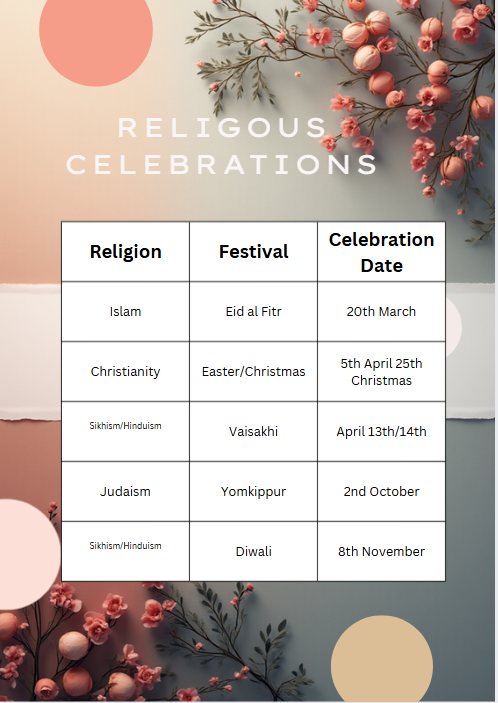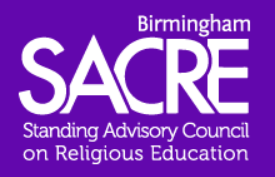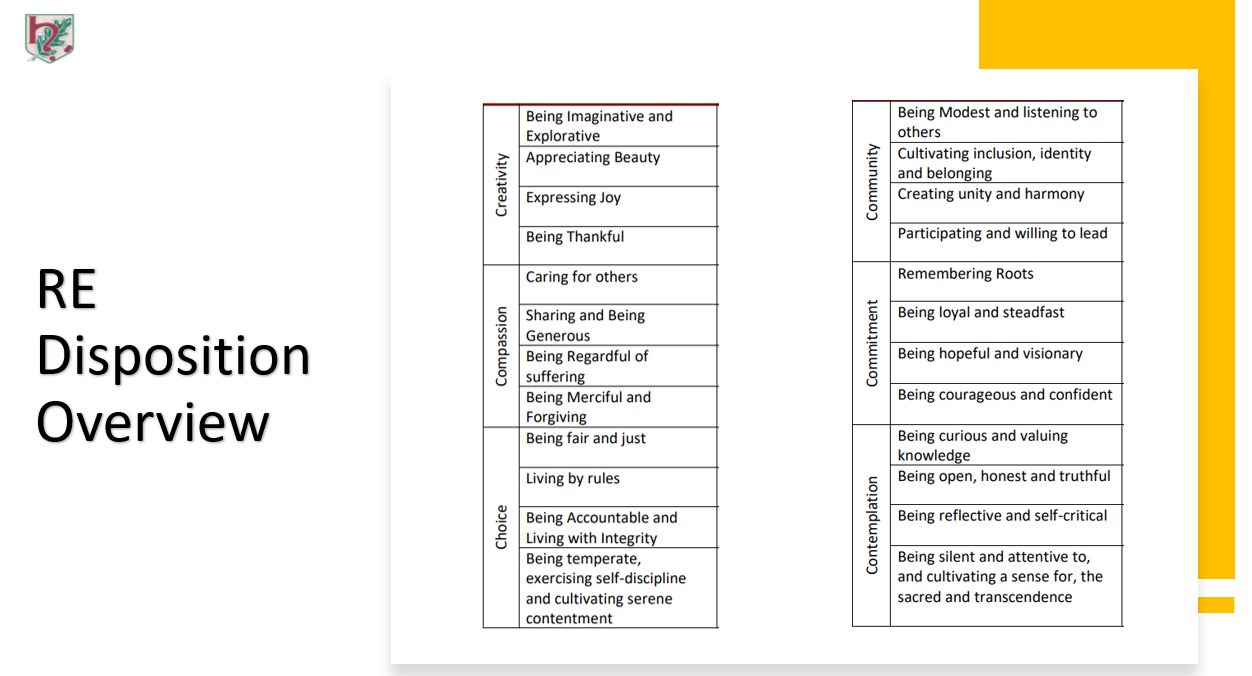Religious Education
Why do we teach R.E?
The Religious Education curriculum at Hawthorn Primary School provides children with the opportunities to explore what people believe and how this impacts their way of life. Children are taught to make connections between religions and non-religious beliefs. RE equips children with the knowledge, understanding and skills needed to handle questions raised by religion and belief in order for them to reflect on their own ideas of living. This will significantly contribute to children’s personal development and well-being. Children tackle difficult questions by learning insights that can work to challenge stereotypes, promote cohesion, and understand extremism. RE is also a very valuable subject, as it encourages children to value themselves and the communities within which they live.
Across the year we celebrate a range of special festivals from the five main religions.


The Birmingham Agreed Syllabus for Religious Education aims to:
• Promote the spiritual, moral, cultural, mental and physical development of pupils at the school and in society
• Prepares pupils for the opportunities, responsibilities and experiences of adult life
• Education of religious life and traditions brings a dimension to the process of educating that is life-enhancing for pupils and specifically contributes to their spiritual and moral development.
Pupils cover 24 dispositions set out in the Birmingham Agreed Syllabus based on a spiral curriculum approach, which are encountered by pupils in each phase of their education forming a progressive and cohesive understanding of the subject. These dispositions are interwoven within different religions and through reference to a range of established non-religious worldviews including Humanism. There has been agreement between the traditions in the city (religious and non-religious) that the 24 dispositions, are qualities or marks of spiritual character they would wish to see developed in pupils. The aim is for all pupils to secure an in-depth understanding of a range of religions and non-religions. By doing this it will encourage our pupils to think about, and act upon, a growing understanding of their own faith or viewpoint, whilst showing empathy to others opinions that may differ.
RE contributes and is significant to the development and well-being of the whole child. It supports a flourishing personal, spiritual and moral character by promoting mutual respect and tolerance in a modern Britain. It offers opportunities for personal reflection and spiritual development. Allowing pupils to see beyond their own cultural experiences. Encouraging open-ness in sharing cultural experiences and challenging stereotypes. This will enable pupils to have an understanding of the different beliefs and practices of various religions including those without a faith and the impact on the world.
The 24 dispositions are covered three times throughout a child’s education with us. This enables pupils to have a greater grasp of the disposition through a variety of religious faiths and beliefs.

EYFS
In early years’ children explore RE through an understanding of the world session which is taught each week. Throughout the year the following statements are covered through stories and circle times.
- Discussions about members of their immediate family and community.
- Name and describe people who are familiar to them.
- Understand that some places are special to members of their community.
- Recognise that people have different beliefs and celebrate special times in different way
ELG - Know some similarities and differences between different religious and cultural communities in this country, drawing on their experiences and what has been read in class.
The main part of RE is taught through religious festivals as they arise throughout the year. Ones that are currently covered are;
Diwali, Bonfire Night / Guy Fawkes, Remembrance, Advent, Christmas, Chinese New Year, Ramadan, Easter and Eid.
Overview of Year Group dispositions KS1 and KS2
The dispositions are based on a spiral curriculum approach, which are encountered by pupils in each phase of their education. Teaching should be focussed on each disposition: once in KS1 and once every two years in KS2.
|
Autumn 1 |
Autumn 2 |
Spring 1 |
Spring 2 |
Summer 1 |
Summer 2 |
|
|
Year 1 |
Creating Inclusion Identity and Belonging Being Thankful |
Being Modest and Listening to Others Expressing Joy |
Being Fair and Just Being Accountable and Living with Integrity |
Being Courageous and Confident Being Loyal and Steadfast |
Remembering Roots Being Hopeful and Visionary |
Being Curious and Valuing Knowledge Being Open, Honest and Truth |
|
Year 2 |
Living by rules Being Temperate, Self-Disciplined and Seeking Contentment |
Responding to suffering Sharing and Being Generous |
Creating Unity and Harmony Participating and Willing to Lead |
Caring for Others, Animals and the Environment Being Merciful and Forgiving |
Being Attentive to the sacred as well as the precious Being Reflective and Self Critical |
Being Imaginative and Exploratory Appreciating Beauty |
|
Year 3 |
Sharing and Being Generous Caring for Others, Animals and the Environment |
Creating Unity and Harmony Participating and Willing to Lead |
Being Fair and Just Being Accountable and Living with Integrity |
Remembering Roots Being Loyal and Steadfast |
Being Open, Honest and Truth Being Attentive to the sacred as well as the precious |
Being Courageous and Confident Being Hopeful and Visionary |
|
Year 4 |
Expressing Joy Being Thankful |
Being Reflective and Self Critical Being Curious and Valuing Knowledge |
Being Modest and Listening to Others Creating Inclusion Identity and Belonging |
Being Merciful and Forgiving Responding to suffering |
Living by rules Being Temperate, Self-Disciplined and Seeking Contentment |
Being Imaginative and Exploratory/Appreciating Beauty |
|
Year 5 |
Caring for Others, Animals and the Environment Sharing and Being Generous |
Being Loyal and Steadfast Being Hopeful and Visionary |
Being Open, Honest and Truthful Being Attentive to the sacred as well as the precious |
Participating and Willing to Lead Being Modest and Listening to Others |
Being Temperate, Self-Disciplined and Seeking Contentment Being Accountable and Living with Integrity |
Being Thankful Being Imaginative and Exploratory |
|
Year 6 |
Living by rules Being Fair and Just |
Creating Unity and Harmony Creating Inclusion Identity and Belonging |
Remembering Roots Being Courageous and Confident |
Responding to suffering Being Merciful and Forgiving |
Expressing Joy Appreciating Beauty |
Curious and Valuing Knowledge Being Reflective and Self Critical |
